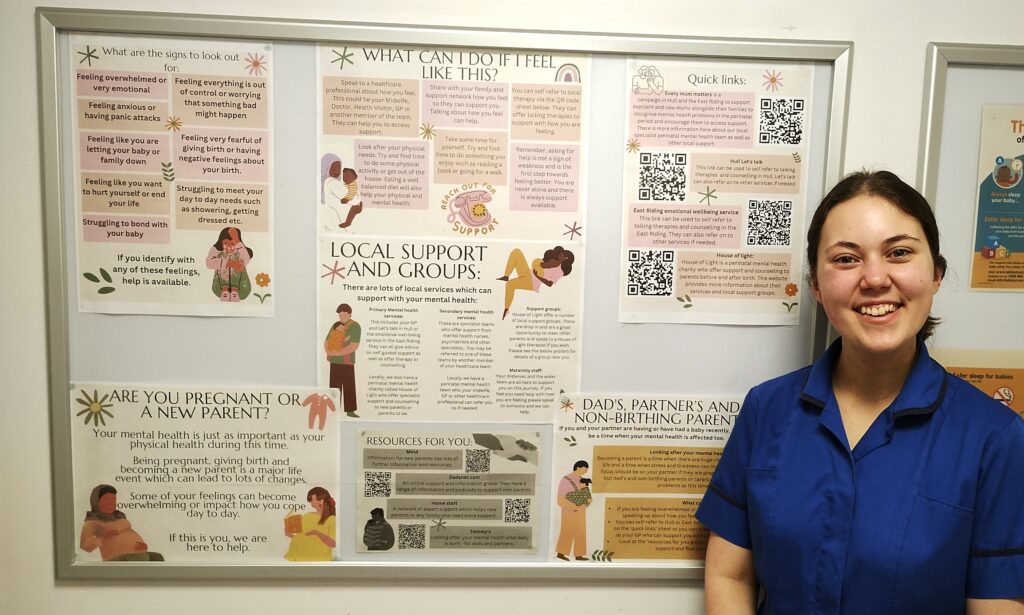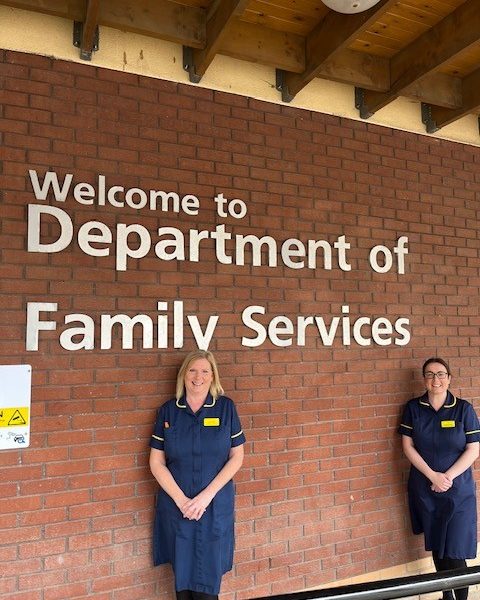Our Perinatal Mental Health Midwives are urging anyone who’s pregnant not to suffer in silence, and instead reach out for help as part of Maternal Mental Health Awareness Week.
Leanne Ellis and Lyndsey Hackett are our Perinatal Mental Health Midwives at Northern Lincolnshire and Goole NHS Foundation Trust, and Amber Yates and Lesley Robson are our Specialist Midwives for Vulnerable Women at Hull University Teaching Hospitals NHS Trust.
They’re supporting the week-long campaign which runs from Monday 29 April to Sunday 5 May. It’s organised and led by the Perinatal Mental Health Partnership UK and is dedicated to talking about mental health problems during and after pregnancy, as well as helping families access the information, care and support they need to recover. The theme this year is ‘Rediscovering you’.
This campaign is dedicated to raising both public and professional awareness of mental health problems during the antenatal and postnatal periods. Leanne, Lyndsey, Amber and Lesley are advocates for people and their families who are affected by maternal mental health challenges, aiming to reduce stigma and ensuring those affected have access to the support and information required to aid their recovery.
Throughout the week, different themes will be explored:
- Monday: Demystifying perinatal mental illness
- Tuesday: Moving together through your changing world
- Wednesday: World Maternal Mental Health Day – stronger together
- Thursday: Finding you in this journey: identify transformation in the perinatal period
- Friday: Perinatal positivity pot: shining a light on parent voices and recovery stories
- Saturday: Support for all: sharing empowering resources for all families in the UK and beyond
- Sunday: Reflections on rediscovery: Looking back over the week.
Leanne said: “Having a baby is a big life event, and it’s natural for people to experience a range of emotions and reactions during and after their pregnancy. But if this starts to have an impact on how you live your life, you might be experiencing a mental health problem. When you conceive or when the new baby arrives, there’s an expectation you should be happy and excited, however it’s estimated one in five will experience a mental health problem.”
Perinatal mental health issues happen during pregnancy or in the first year following birth. They can have long-lasting effects on you and your family if left untreated. But mental health problems are treatable and recognising the signs early and seeking support quickly improves recovery and outcomes for you and your baby. These mental health symptoms can fluctuate and may include:
- A lack of interest in things you enjoy doing
- Severe mood swings
- Difficulty bonding with baby
- Isolation from friends and family
- Intrusive and obsessive thoughts.
Lyndsey said: “It’s important to ask for help and support. You’re likely to find that many new parents are feeling the same way. It’s about helping those affected by maternal mental problems to access the information and help they need to support their recovery.”
Examples of perinatal mental health problems include antenatal and/or postnatal depression, anxiety, obsessive compulsive disorder, postpartum psychosis and post-traumatic stress disorder (PTSD). These illnesses can be mild, moderate or severe, requiring different kinds of care or treatment.
Amber said: “Maternal Mental Health Awareness Week remains as important as ever in demystifying perinatal mental illness and increasing recognition of this important issue which affects so many families. I would urge anyone who is struggling to speak to your midwife or healthcare professional. We are always here to help and speaking up about how you feel is the first step in accessing support.”

Lyndsey, Leanne, Amber and Lesley are on hand to provide extra support for local parents and their families, working alongside other healthcare professionals, including the Specialist Perinatal Mental Health service, Community Mental Health Team and NHS Talking Therapies, ensuring you and your family receive the help and support you need. It’s important also to recognise the need of the whole family at this time, so please discuss this with your healthcare professional so support can be discussed.

Further information can be found at www.everymummatters.com and the Perinatal Mental Health Partnership website at: https://maternalmentalhealthalliance.org/.
Please drop in to meet the teams in North and North East Lincolnshire:
- Monday 29 April in the Antenatal clinic, Acorn Suite, Grimsby hospital
- Thursday 2 May in the Antenatal clinic, Scunthorpe hospital.
In Hull, Amber and Lesley will be popping onto the maternity wards with a tea and teaching trolley, to raise awareness and give out information.
